School of Hard Laughs
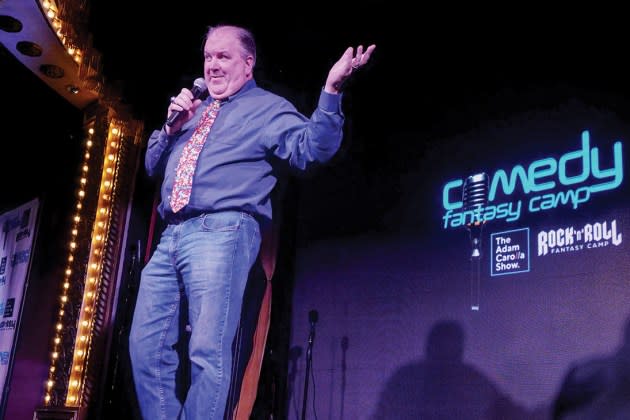
On May 5, 1979, the writers of Fantasy Island made a strange decision. After 35 successful episodes in which guests paid to live out dreams such as being a king, marrying a millionaire, finding the fountain of youth and having a harem, they offered viewers “The Comic,” in which a guy gets to be a stand-up.
Over the next decades, industries would rise to whisk money from middle-aged middle management in exchange for fulfilling their deepest wishes. They got to put on Dodger uniforms with their names on the back and practice grounders with Steve Garvey at baseball fantasy camps. Play guitar in a band with Roger Daltrey at rock fantasy camps. Get B-12 shots in their ass with Gwyneth Paltrow at the In Goop Health conference. Which makes sense. Because those things are fun. People spend their weekends in softball leagues, playing in bar bands with co-workers and getting detox massages. They don’t do that with comedy. No one meets with friends in their garage to do a tight five in front of one another. Stand-up is many things — a slog, a gig, an obsession, a pathology … but a fantasy?
More from The Hollywood Reporter
Jeffrey Katzenberg Confirmed to Present Award to Byron Allen at Visionary Ball in Beverly Hills
The Second City Opening New York Entertainment Complex in November
The inaugural four-day Comedy Fantasy Camp “featuring Jay Leno, Adam Carolla and many more” challenges my presumption, promising that for $3,499 ($4,499 for the VIP mentorship package that includes a dinner with some of the pros), guests will “learn from comedy’s greatest comics and TV writers.” The camp sold out quickly, adding campers until they managed to squeeze 83 aspiring comics into the small dark theater hidden behind a bookcase on the bottom floor of the Hollywood Roosevelt hotel.
The camp is run by David Fishof, 67, a former sports agent and rock tour producer who created Rock ’n’ Roll Fantasy Camp in 1997. Thanks to Fishof, thousands of people have spent a weekend playing and writing songs with rockers such as Nancy Wilson of Heart and Slash of Guns N’ Roses — including Homer Simpson, who went during season 14. But who is paying $3,500 to josh around with Adam Carolla? And what are they hoping to get out of it? And would they be able to explain that to me without making a joke about getting away from their wives?
Few people in the world look more like camp counselors than Fishof. Slightly stooped with unkempt hair, he runs around in his Comedy Fantasy Camp T-shirt micromanaging everything, sporadically leaping onstage and hype man-ing “Wasn’t that incredible?” The least surprising thing about Fishof is that he booked acts such as Henny Youngman at the Grossinger’s resort in the Catskills. I don’t know the Yiddish word to describe Fishof, but I am guessing there are 50 to choose from.
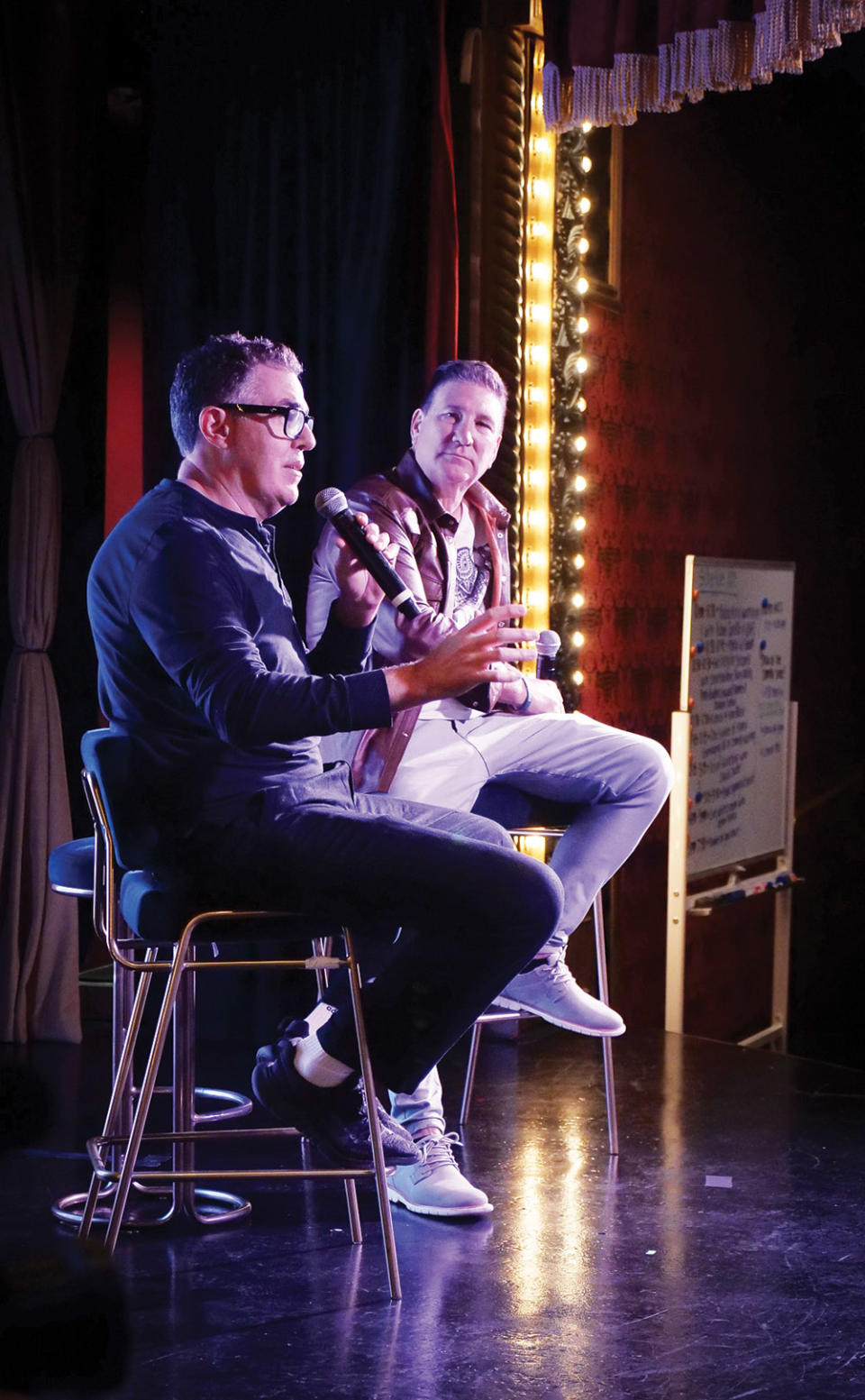
***
Two years ago, Fishof went on Carolla’s podcast to promote Rock Camp, the documentary about his business. On air, Carolla suggested he start a comedy version. Off air, they formed a partnership. “I want to change people’s lives,” Fishof tells me. “They had to do a regular job, but inside, they wanted to be a comic.”
Fishof let me participate (for free) for all four days. If the camp is a success, this should be the funniest thing you’ve ever read.
The first thing we all discover is that unlike playing in a band or for a team, comedy isn’t a group activity. Most of our four days are spent listening to lectures. We crowd into the small dark theater and try to grab seats where we can see past the columns and onto the stage. It’s less like Comedy Camp and more like Comedy Learning Annex.
Another challenge is that while athletes’ confidence and work ethic make them natural motivational speakers, comics have the opposite job. They’re people who are not their best during daylight. They’re dark cynics looking to mock. So when the first speaker goes onstage, the fantasy is quickly shattered. Carol Leifer has a hall-of-fame comedy career. She was on Letterman’s show 25 times. She’s opened for Frank Sinatra. She wrote for Seinfeld and Curb Your Enthusiasm. And she tells us … comedy is hard. She says she bugs people so often for work, her career advice is to approach people with, “Would it be possible …” Then she goes to the corner of the room to sell her books for $20.
Everyone who comes onstage issues a warning. Kevin Hench, a sitcom writer who ran Tim Allen’s Last Man Standing, starts this lecture by saying that comedy isn’t fun anymore because there are so few outlets and everyone is wary about what they’re allowed to say: “Now you’re getting into comedy? Now? Was Chlamydia Camp all sold out? It’s like being a U.S. Army recruit in 1965. ‘It’s going to be great. You’ll learn to weld.’ ” Even Jay Leno tells everyone that “it’s not a very dignified profession.” Which seems obvious, given that Jay Leno is at Comedy Fantasy Camp. Stand-up Alonzo Bodden tells the campers, “I’m never surprised when a comic commits suicide. Because it’s tough. You’re always almost there. and it gets depressing, and you’re by yourself.”
I worry that my fellow campers are crestfallen. They are not. They are rapt, taking way more notes in their Comedy Camp binders than I’m taking for this article. These people are definitely going to say “Would it be possible” all the time.
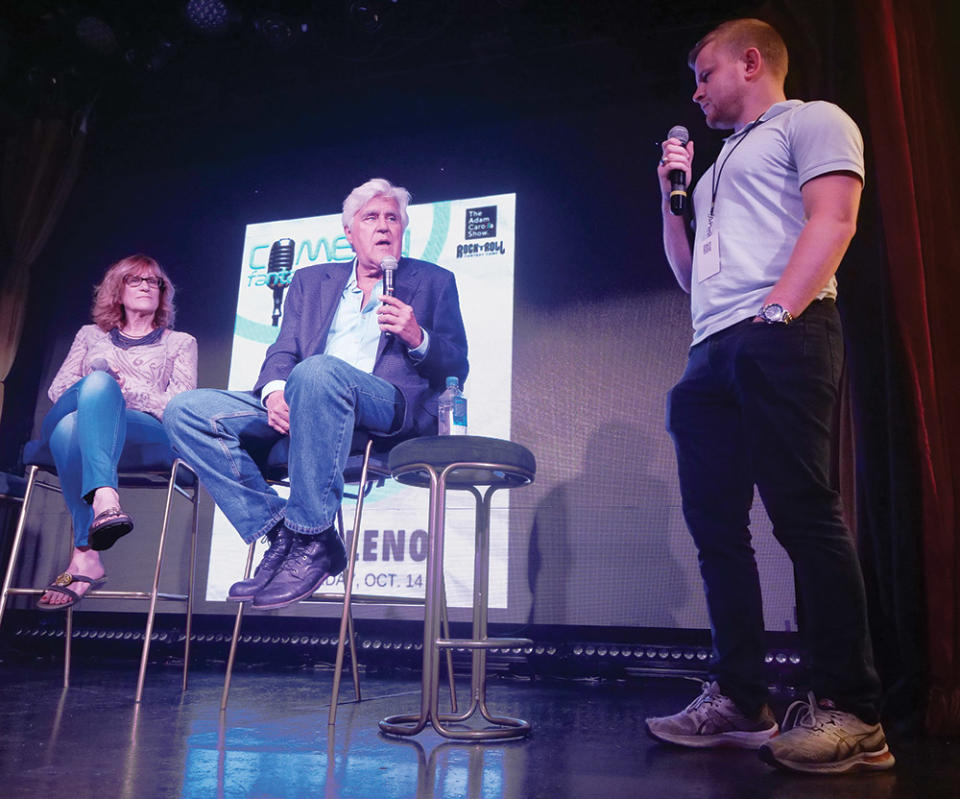
***
Fishof welcomes a speaker he’s even more than usual excited about. It’s his son-in-law, Rabbi Shlomo Einhorn. He’s here to deliver a PowerPoint titled “The Future of Funny: Leveraging AI in Comedy Writing.” He is four minutes into his presentation when I realize this is not a bit. He really is Rabbi Shlomo Einhorn, and he really is giving a PowerPoint titled “The Future of Funny: Leveraging AI in Comedy Writing.” Rabbi Shlomo has, by spending untold hours on ChatGPT, created “George Pryor,” a virtual Frankenstein’s monster of George Carlin and Richard Pryor parts. Rabbi Shlomo can’t believe he gets to spend time, from his very own house, having long discussions with George Pryor. Almost all the campers are taking notes.
These people are different from rock ’n’ roll fantasizers, I realize. They’re not here to tell their co-workers they jammed with Tommy Lee. They want to become comics. They want to learn.
They are an unusual group of aspirants. There’s a 19-year-old who just quit the Florida State baseball team looking to see if this is his new calling. A 16-year-old who goes to a high school for gifted kids and is so focused on this career that he’s already performing in clubs, telling a joke about how he gets upset when school shootings occur outside the U.S. because it’s cultural appropriation. Bill Klein and Jennifer Arnold, a business owner and a doctor who starred on the TLC reality show The Little Couple for 14 seasons, are seeing if they should turn their charm into a stand-up act. A Jewish shaman from Utah who calls herself “Shamama” wants to use comedy to teach people about the healing power of psychedelics. After not performing stand-up for decades, Christopher Patrick Lucas, who wrote for SNL for a year and is the voice of Congressman Alex Shrub on Grand Theft Auto, wants to try it again.
Kristi Schiller signed up her friend Alissa Blow, a lesbian makeup artist whose dad was a drug kingpin, whom she met on Instagram and then hired to work on her charity, K9s4COPs. Schiller posed for Playboy in 1996 when she was local morning DJ Lucy Lipps, married an oil mogul and housed Kyle Rittenhouse for a year on her ranch.
“I expected it to be 30th anniversary presents for dentists their wives bought them,” says Carolla. “There was old and young and disabled. It was cool that there was a crazy chasm of different people. It was a rogue’s gallery of people with a slight dusting of misfit. These people are different and don’t fit in nicely with society.”
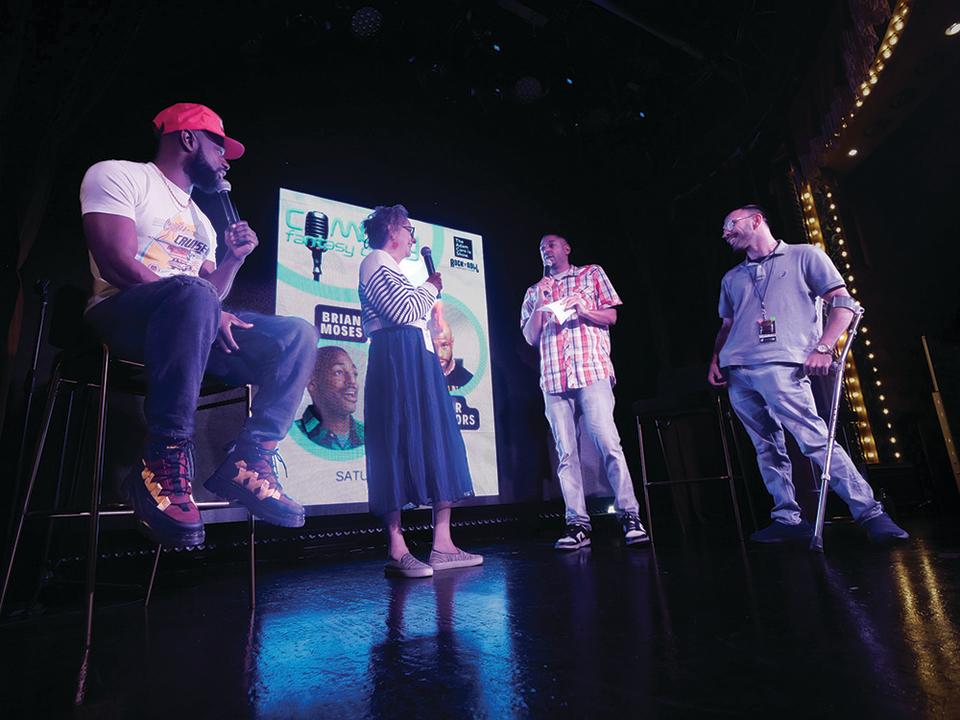
Because most attendees learned about the camp through Carolla’s podcast, they skew conservative (Carolla has, in recent years, become a fierce opponent of what he deems “woke” culture). I discover this group’s political leaning during a lesson on roasting, when comedians Brian Moses and Jamar Malachi Neighbors bring campers onstage to insult one another. One battler introduces himself as a dairy farmer. His opponent is Norm Pattis, who has come here because he wants to share the funny, dark stories about his work that make his co-workers laugh. “I can never tell if people in my firm are laughing because I’m funny or because I write their checks,” he says. When pressed for roasting fodder, Pattis explains that he’s a lawyer who represents Alex Jones and several Proud Boys who were inside the Capitol on Jan. 6. The dairy farmer looks Pattis over, pauses, then lets loose.
“You look like Penn Jillette raided Mr. Rogers’ wardrobe.”
This is not necessarily the material about Pattis most comics would have mined. I, for instance, jotted this in my notebook about Norm Pattis while he was onstage:
— The only thing you hate more than democracy are jokes.
— Unlike your clients, you are not killing.
— The only reason the Proud Boys hired you as their lawyer was so they could picture something whenever they’re tempted to masturbate.
I had nothing in my notebook about Mr. Rogers.
Between the lectures, there is some hands-on training, which the campers love. They get great performance tips from comedian Caroline Rhea, who co-starred in Sabrina the Teenage Witch. David Zucker, the director and co-writer of Airplane! and Naked Gun, goes over submitted sketches. Leno and Leifer have a few people come up and do their act so they can offer constructive criticism. Leno suggests a joke to Dino, who has cerebral palsy: Dino should tell the audience he’s hoping for an earthquake so he can walk normally. Worse, Leifer and Leno tell another camper that “pumpkin spice is a really good area.”
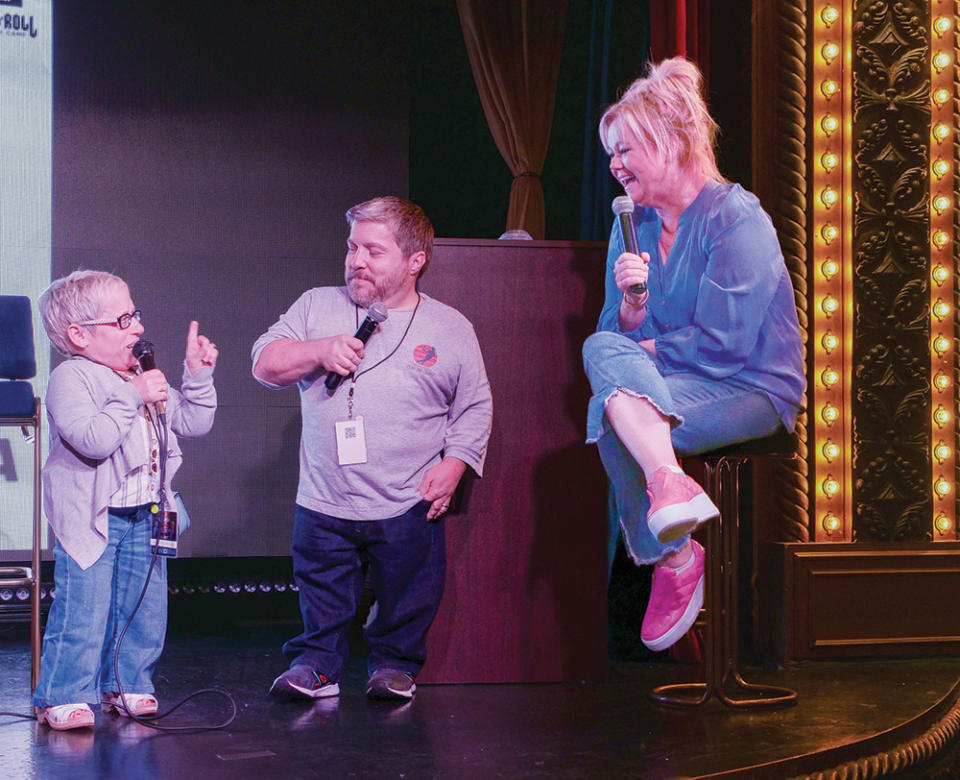
Carolla says that none of the professionals he asked to participate turned him down. “Nobody said let’s go get Seinfeld, because he’s not doing this,” says Carolla. “But Caroline Rhea, Alonzo Bodden, they’re at an age where they want to mentor more than get paid to go to Wisconsin. They felt that it was more than a gig.”
One of the professional instructors is Megan Koester, who does not take fools lightly. I know this because in 2016 she spent a fair amount of time trolling me on the internet for being a hack.
One of the camp counselors called her a few days ago and offered her $50 to teach. She couldn’t figure out why anyone would pay $6,000 for comedy camp. “There is no barrier to comedy. Anyone can do an open mic,” she says. “You’re paying people to validate you. You’re paying them $6,000 to listen to how you hate your wife onstage and not say, ‘You have no business doing this.’”
On Sunday afternoon, all 83 campers go onstage at the Improv, in front of a packed house of one another. Carolla and Bodden sit on the side in the front, like boxing judges. It looks terrifying. Like going to Rock ’n’ Roll Fantasy Camp and having to write a song while Kenny Loggins watches, if Loggins were a former boxing instructor who rants about everyone’s incompetence on his podcast every day.
But being scared is the point. Comedy, as we’ve been told over and over, is hard. But the other campers are supportive, giving one another the strength they need to do this. Plus, they’re $3,499 pot committed.
A few of the campers use their five minutes to rip into the camp. “I learned a lot this week. A lot. I learned that Jay Leno and Adam Carolla went broke during the strike and had to come up with a grift. You couldn’t sell some cars?” asks production company owner Lanlin Wong.
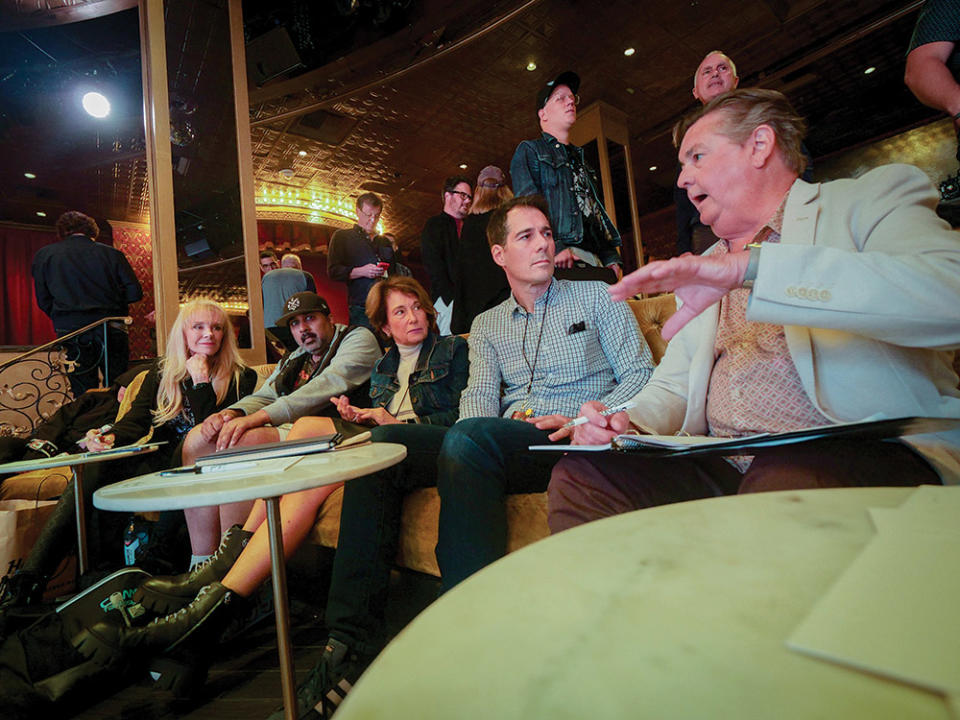
Backstage, I ask Leno, who seems decades younger when he’s performing, why he came. “Adam said, ‘Would you like to talk to some comedians?’ I like talking to comedians. I have more in common with comedians than some people I’ve known my whole life.”
This, it turns out, is what the campers have really come for: community. What these people have paid for, whether they knew it or not, wasn’t Adam Carolla or Jay Leno or Rabbi Shlomo Einhorn. It wasn’t even getting onstage. The real comedy fantasy isn’t doing comedy. It’s being a comedian — the part when you get offstage and sit at a table at a Canter’s with Amy Schumer and Dave Attell, trying to think of something hilarious to keep up with them. Like so much else, it’s about finding your people.
And they have. “I would have paid twice as much,” says Kristi Schiller, the K9s4COPs founder. Susan Guidi, a grandmother of seven who lost 50 pounds during the pandemic and became a competitive bodybuilder, says she felt seen. “When this opportunity to be in community with like-minded funny humans came, I jumped at the chance,” she adds. Elliot Mealer, a former offensive lineman for the University of Michigan who was signed by the New Orleans Saints and now works as an actor — he’s a man who has already fulfilled two fantasies — says he “entered into a fraternity I always dreamt about joining.”
When Pattis finishes his stage time, which is a lot more self-deprecating than the material he came in with, it is not the comedy professionals whose approval he yearns for. “I think it went well,” he says, “because some of the most beautiful women in the class offered to buy me drinks.”
Carolla says he’s going to hold the camp again, with fewer lectures and more coaching. Because back when he was trying to gain a toehold in the industry, taking Groundlings courses and improv classes in church basements, he would have loved something like this “if somebody had underwritten it for me.”
This story first appeared in the Oct. 25 issue of The Hollywood Reporter magazine. Click here to subscribe.
Best of The Hollywood Reporter
Best Moments of Taylor Swift's Eras Tour: Surprise Songs, Guests and More
Harvey Weinstein's "Jane Doe 1" Victim Reveals Identity: "I'm Tired of Hiding"

